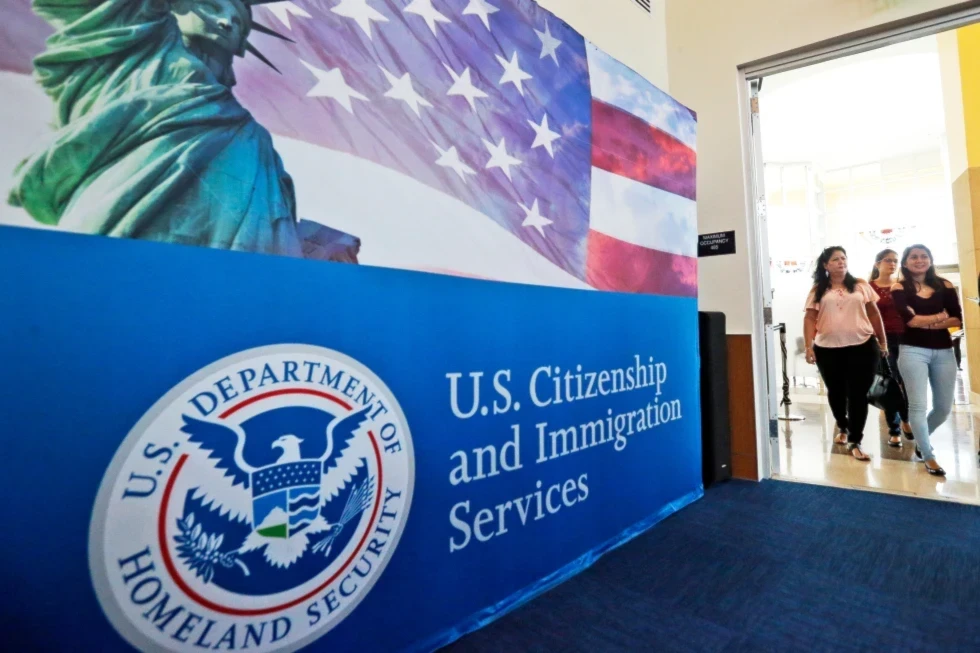Trump orders Gaza-linked social media checks for visas
The Trump administration has ordered social media vetting for all US visa applicants with travel history to Gaza since 2007, raising concerns over free speech and civil liberties.
-
 People arrive at the US Citizenship and Immigration Services in Miami, August 17, 2018. (AP)
People arrive at the US Citizenship and Immigration Services in Miami, August 17, 2018. (AP)
The Trump administration reportedly directed a social media screening for all US visa applicants who have visited the Gaza Strip on or after January 1, 2007, according to Reuters. This directive, which aims to strengthen security checks for foreign travelers, was revealed in an internal State Department cable.
The order mandates that the social media vetting applies to both immigrant and non-immigrant visa applicants, including non-governmental organization (NGO) workers and anyone who has been in Gaza in any official or diplomatic role.
This cable was sent to all US diplomatic and consular posts. The move is part of a broader push by President Trump's administration, which has already revoked hundreds of visas across the US and even retracted the legal status of some lawful permanent residents. The pretext the administration resorted to for its moves is the 1952 law that permits the deportation of any immigrant whose presence is allegedly deemed harmful to US foreign policy by the Secretary of State.
The cable specifies, "if the review of social media results uncovers potential derogatory information relating to security issues, then a SAO must be submitted," referring to a security advisory opinion (SAO), an interagency investigation to assess whether a visa applicant may pose a national security risk.
They also reiterated that all visa applicants are continuously monitored, and "security vetting runs from the time of each application, through adjudication of the visa, and afterwards during the validity period of every issued visa, to ensure the individual remains eligible to travel to the United States."
US immigration authorities have been known to employ tactics, such as creating fake social media profiles to monitor and investigate individuals. For instance, in 2019, US Immigration and Customs Enforcement (ICE) was reported to have created fake profiles resembling university affiliations to investigate foreign students suspected of immigration fraud, as reported by The Guardian.
Trump's war on free speech
The cable, dated April 17, was signed by US Secretary of State Marco Rubio, who mentioned in late March that he had already revoked over 300 visas. When asked about the cable, a State Department spokesperson declined to comment on internal communications but claimed that all potential travelers to the US undergo comprehensive interagency security vetting.
"The Trump Administration is focused on protecting our nation and our citizens by upholding the highest standards of national security and public safety through our visa process," the spokesperson stated.
In addition, Trump administration officials have suggested that student visa holders who support Palestinians or criticize "Israel’s" actions in Gaza could face deportation, claiming such actions pose a threat to US foreign policy interests. Critics argue that these measures infringe on free speech rights protected by the First Amendment of the US Constitution.
Despite the constitutional guarantee of freedom of speech for all individuals, regardless of immigration status, there have been notable instances of the administration revoking visas for students who voiced opposition to "Israel’s" military actions in Gaza.
One of the most high-profile cases involved the arrest of Rumeysa Ozturk, a Turkish student from Tufts University, captured on video as masked agents detained her.
When asked about Ozturk’s case at a press conference last month, Rubio responded, "Every time I find one of these lunatics, I take away their visas" and warned that more individuals could face similar consequences.

 4 Min Read
4 Min Read









